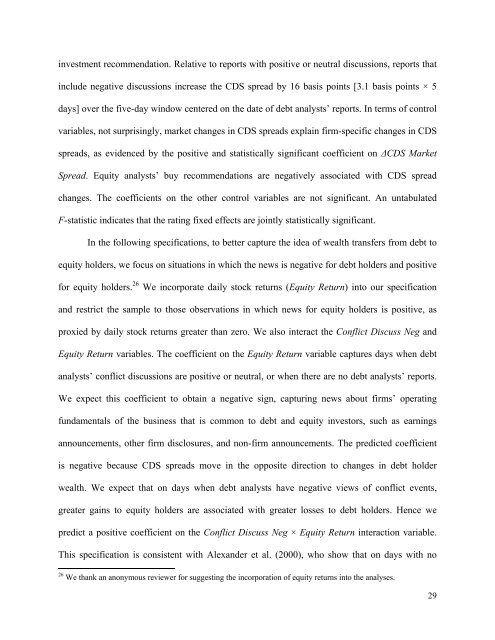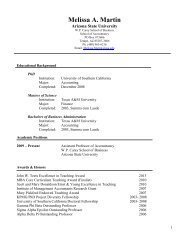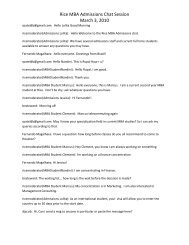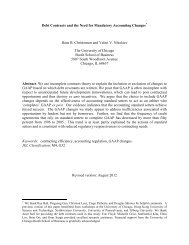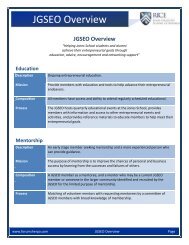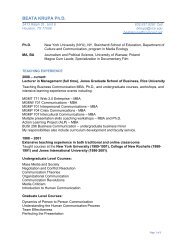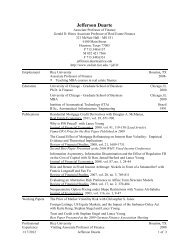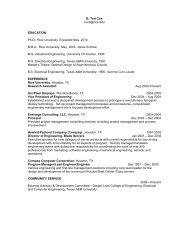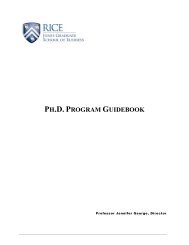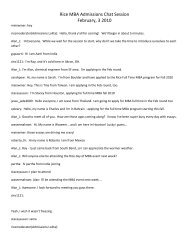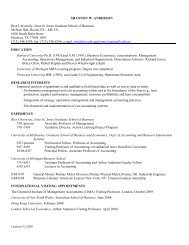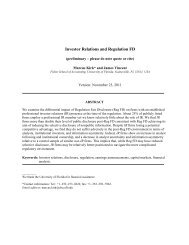Debt Analysts' Views of Debt-Equity Conflicts of Interest
Debt Analysts' Views of Debt-Equity Conflicts of Interest
Debt Analysts' Views of Debt-Equity Conflicts of Interest
You also want an ePaper? Increase the reach of your titles
YUMPU automatically turns print PDFs into web optimized ePapers that Google loves.
investment recommendation. Relative to reports with positive or neutral discussions, reports that<br />
include negative discussions increase the CDS spread by 16 basis points [3.1 basis points × 5<br />
days] over the five-day window centered on the date <strong>of</strong> debt analysts’ reports. In terms <strong>of</strong> control<br />
variables, not surprisingly, market changes in CDS spreads explain firm-specific changes in CDS<br />
spreads, as evidenced by the positive and statistically significant coefficient on ΔCDS Market<br />
Spread. <strong>Equity</strong> analysts’ buy recommendations are negatively associated with CDS spread<br />
changes. The coefficients on the other control variables are not significant. An untabulated<br />
F-statistic indicates that the rating fixed effects are jointly statistically significant.<br />
In the following specifications, to better capture the idea <strong>of</strong> wealth transfers from debt to<br />
equity holders, we focus on situations in which the news is negative for debt holders and positive<br />
for equity holders. 26 We incorporate daily stock returns (<strong>Equity</strong> Return) into our specification<br />
and restrict the sample to those observations in which news for equity holders is positive, as<br />
proxied by daily stock returns greater than zero. We also interact the Conflict Discuss Neg and<br />
<strong>Equity</strong> Return variables. The coefficient on the <strong>Equity</strong> Return variable captures days when debt<br />
analysts’ conflict discussions are positive or neutral, or when there are no debt analysts’ reports.<br />
We expect this coefficient to obtain a negative sign, capturing news about firms’ operating<br />
fundamentals <strong>of</strong> the business that is common to debt and equity investors, such as earnings<br />
announcements, other firm disclosures, and non-firm announcements. The predicted coefficient<br />
is negative because CDS spreads move in the opposite direction to changes in debt holder<br />
wealth. We expect that on days when debt analysts have negative views <strong>of</strong> conflict events,<br />
greater gains to equity holders are associated with greater losses to debt holders. Hence we<br />
predict a positive coefficient on the Conflict Discuss Neg × <strong>Equity</strong> Return interaction variable.<br />
This specification is consistent with Alexander et al. (2000), who show that on days with no<br />
26 We thank an anonymous reviewer for suggesting the incorporation <strong>of</strong> equity returns into the analyses.<br />
29


